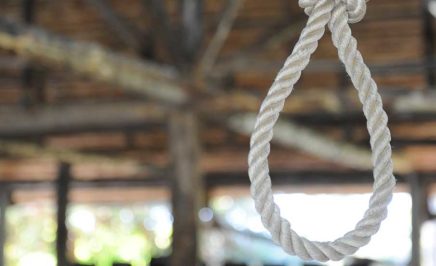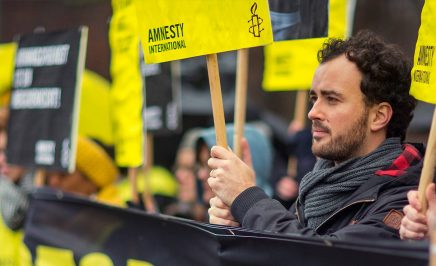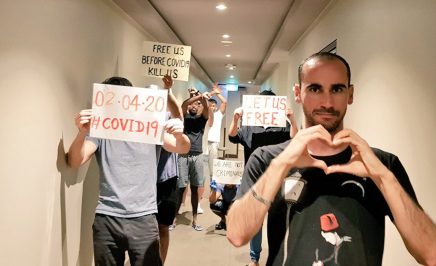Content warning: details of the murder of a non-binary gay man.
Earlier this month Alireza Fazeli Monfared, who self-identified as a non-binary gay man, was brutally murdered in his hometown in Iran. His killers are yet to face justice – and under Iran’s justice system, are unlikely to.
Alireza was murdered on 4 May in Ahvaz, Khuzestan province. Friends of the twenty-year-old have informed Amnesty International that this murder took place after Alireza was abducted by several male relatives, and driven to an unknown location.
The relatives called Alireza Fazeli Monfared’s mother the following day, informing her that they had killed her son and dumped his body under a tree. Authorities have since recovered Alireza’s body, but are yet to make any arrests.
It is crucial to unpack the homophobic and transphobic motivations behind Alireza’s murder, and the Iranian laws that work to legitimate such motivations in criminal courts. The horrifying murder of Alireza is a wake-up call for the urgency of protecting LGBTQIA+ rights.
Risk factors connected to gender expression and sexual orientation
As a self-identified non-binary gay man, Alireza has been subject to repeated homophobic and transphobic harrassment and death threats from several of his male relatives in recent years. Testimonies from his partner and a close friend confirm several occasions of attempted physical violence, in addition to at least one instance of arbitrary arrest and detainment connected with Alireza’s Instagram account.
Several voicemails received by his partner outline Alireza’s plan to leave Iran after being repeatedly denied the freedom to express himself by both Iranian authorities and family members. He was due to leave the country only a few days after he was murdered.
Human rights violations against LGBTI people
Iran’s legal framework continues to criminalise consensual same-sex relations and forms of gender expression that do not conform to strict binary gender norms, even as these laws function to legitimise and incite violence against LGBTI+ individuals.
Iran’s 2013 Islamic Penal Code prescribes abhorrent corporal punishments, such as flogging and the death penalty, for the “crime” of same-sex relations. Sexual activity as minimal as “kissing or lustful touching” can be met with between 31 and 74 lashes, while anything beyond, if a repeated offence, can attract the death penalty.
Individuals who do not conform to stereotypical norms of “femininity” and “masculinity” are similarly penalised under Iranian criminal law. These penalties can include imprisonment and/or flogging under articles condemning conduct that is “religiously forbidden” (haram) or “offensive to public decency.” Any gender presentation outside of what is expected from an individual’s biological sex at birth must be accompanied by a legal sex change, or else be considered a criminal offence. This mandates gender reassignment surgery, sterilisation, and a complex documentation process for all gender non-conforming individuals, and threatens all who do not comply with criminal prosecution.
So-called ‘conversion practices aimed at eliminating homosexuality and gender non-conformity has also endured in Iran, including such abusive practices as electric shocks, hormones, and strong psychoactive medications.
Alireza received a military exemption card two days before his murder, exempting him from compulsory military service due to “perversions that are contrary to social and military values (including sexual perversions and homosexuality)”. Despite its degrading and discriminatory nature, this clause is commonly used by LGBTQIA+ people in Iran as a strategy to avoid the homophobic and transphobic abuse prevalent in military settings. The card clearly states this, thus disclosing to anyone with access to the card that his exemption was on the basis of sexual orientation or gender identity.
This policy is a breach of the right to privacy, and puts gay, transgender and gender non-conforming individuals in Iran at risk of violence and discrimination. On a phone call with his partner, Alireza is said to have voiced concern that the envelope holding his card had been opened and resealed, leading some Iranian LGBTI+ human rights activists to suspect the exemption card’s indication of sexual orientation as a factor triggering or aggravating the risks that led to his murder.
Laws facilitating so-called “honour” killings
“Honour” killings remain widespread in Iran – approximately 375 to 450 “honour” killings occur annually in Iran – but are dramatically underreported. A robust framework of legislation exonerates perpetrators or reduces punishment for murders related to the defence of “honour,” which therefore works to justify and normalise violence against women, girls, and LGBTI+ individuals.
One element of this legislation dictates that murderers are exempt from being charged with the death penalty if their victim committed a hadd crime, which is a crime with fixed punishments under Shari’a law and is considered one against God. Consensual same-sex relations fits the definition of a hadd crime. While the death penalty is abhorrent under all circumstances, reducing sentences for murder on the basis of whether it targeted an LGBTQIA+ individual encourages an atmosphere of impunity and places members of the community at considerable risk.
People like Alireza Fazeli Monfared should be guaranteed the right to life, non-discrimination, privacy, and freedom of expresssion. These rights being violated speak to a wider failure to protect the LGBTI+ community in Iran.





